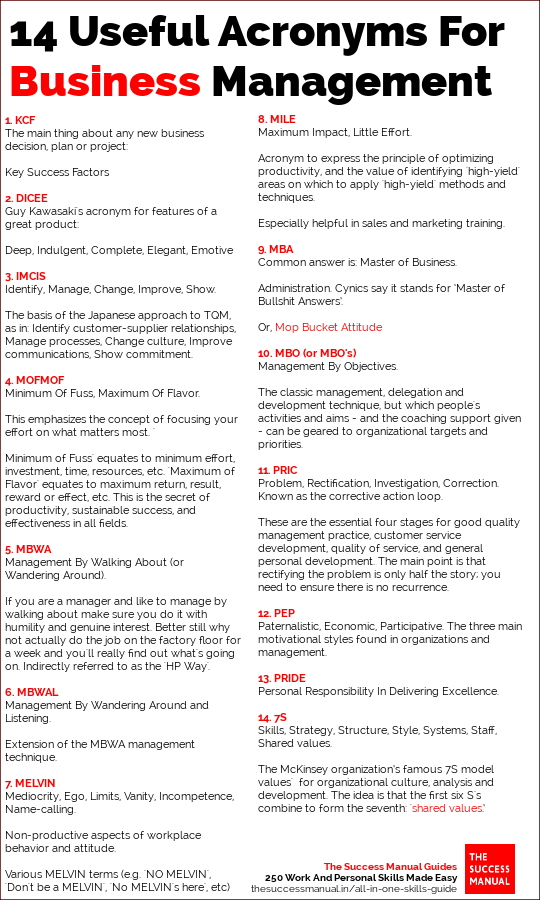14 Useful Business Management Acronyms
Business management skills
1. KCF
The main thing about any new business decision, plan or project:
Key Success Factors
2. DICEE
Guy Kawasaki's acronym for features of a great product:
Deep, Indulgent, Complete, Elegant, Emotive
3. IMCIS
Identify, Manage, Change, Improve, Show.
The basis of the Japanese approach to TQM, as in: Identify customer-supplier relationships, Manage processes, Change culture, Improve communications, Show commitment.
4. MOFMOF
Minimum Of Fuss, Maximum Of Flavor.
This emphasizes the concept of focusing your effort on what matters most. 'Minimum of Fuss' equates to minimum effort, investment, time, resources, etc. 'Maximum of Flavor' equates to maximum return, result, reward or effect, etc. This is the secret of productivity, sustainable success, and effectiveness in all fields.
5. MBWA
Management By Walking About (or Wandering Around).
If you are a manager and like to manage by walking about make sure you do it with humility and genuine interest. Better still why not actually do the job on the factory floor for a week and you'll really find out what's going on. Indirectly referred to as the 'HP Way'.
6. MBWAL
Management By Wandering Around and Listening. Extension of the MBWA management technique.
7. MELVIN
Mediocrity, Ego, Limits, Vanity, Incompetence, Name-calling.
Non-productive aspects of workplace behavior and attitude. Various MELVIN terms (e.g. 'NO MELVIN', 'Don't be a MELVIN', 'No MELVIN's here', etc) help remind people of the behaviors to avoid, especially in blame cultures or negative-thinking environments.
8. MILE
Maximum Impact, Little Effort.
Acronym to express the principle of optimizing productivity, and the value of identifying 'high-yield' areas on which to apply 'high-yield' methods and techniques.
Especially helpful in sales and marketing training.
9. MBA
Common answer is: Master of Business Administration. Cynics say it stands for ‘Master of Bullshit Answers’.
Or, Mop Bucket Attitude
10. MBO (or MBO's)
Management By Objectives. The classic management, delegation and development technique, but which people's activities and aims - and the coaching support given - can be geared to organizational targets and priorities.
11. PRIC
Problem, Rectification, Investigation, Correction.
Known as the corrective action loop. These are the essential four stages for good quality management practice, customer service development, quality of service, and general personal development. The main point is that rectifying the problem is only half the story; you need to ensure there is no recurrence.
12. PEP
Paternalistic, Economic, Participative. The three main motivational styles found in organizations and management.
13. PRIDE
Personal Responsibility In Delivering Excellence.
14. 7S
Skills, Strategy, Structure, Style, Systems, Staff, Shared values.
The McKinsey organization’s famous 7S model values' for organizational culture, analysis and development. The idea is that the first six S's combine to form the seventh: 'shared values.’
Thank you for reading.
If you found this list useful, please share this with your friends and family.
There are 200+ guides to succeeding in business, career and personal life in The Success Manual. Get the pdf ebook for $12 only.